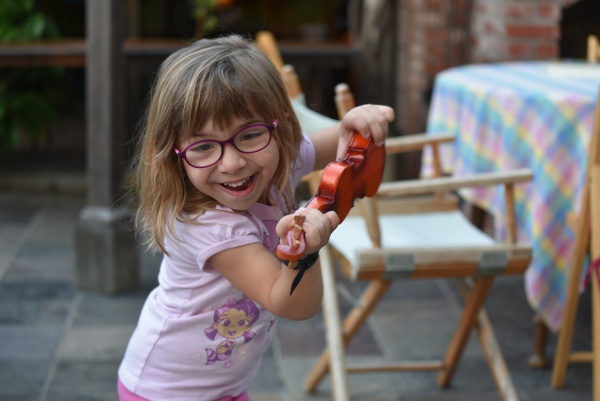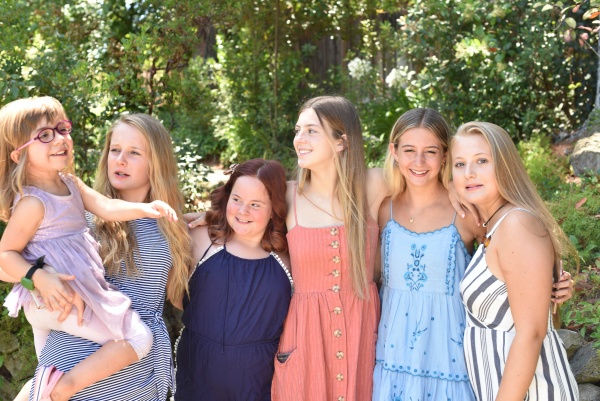Marcia and Nat’s granddaughter Julia was diagnosed with NF1 when she was three years old. Through their own personal experiences, they believed a support group would be beneficial to the family, but could not find one specific to NF in the area. So, with the support of their granddaughter’s doctor, they started their own. Via email, Marcia and Nat shared more about the origin of their group and what a joy Julia is to have in their family.
CTF: Tell us about the time when your granddaughter was diagnosed with NF1. What was it like for you, in the beginning, as grandparents?
Marcia and Nat: We knew from early on that there was a possibility of a genetic condition, both from Julia’s café au lait spots and from her slower-than-normal motor and speech development. She was diagnosed with NF1 at about age three (she’s five now).
Our first reaction was to look up NF on the internet, which is of course the wrong thing to do. You see nothing but the worst cases — it’s quite demoralizing.
Our second reaction was to try to find salvation in gene editing — CRISPR, for example. We had contacts in the Stanford Medical School who pointed us to Dr. David Stevenson, a pediatrician and geneticist who is an expert in NF. He graciously took time to explain NF and its consequences to us. He told us that a genetic cure has not yet been developed. He mentioned ongoing research to help in a number of areas, including the promising developments in MEK inhibitors.
Why did you start the Bay Area Support Group?
We worried quite a bit about what the condition would mean for our granddaughter — both physically and mentally, as well as emotionally. But we worried even more about the toll it would take on our daughter Deborah. It’s hard enough for a parent to raise a child without the added stress of complications from NF.
We thought it would be good if she could get hooked up with a local support group, where she could learn how other parents were dealing with it, maybe get some helpful ideas for her own family, and just be able to talk with others who would understand.
 But we couldn’t find anything like that in the San Francisco Bay Area. (We live on the peninsula and Deborah and Julia live not too far away, in the south bay.) We were surprised. We have quite a bit of familiarity with support groups since Marcia, for many years, has run a vibrant local group for a neurological condition she suffers from — spasmodic dysphonia — which is a much rarer condition than NF. In fact, there are local SD support groups throughout the country.
But we couldn’t find anything like that in the San Francisco Bay Area. (We live on the peninsula and Deborah and Julia live not too far away, in the south bay.) We were surprised. We have quite a bit of familiarity with support groups since Marcia, for many years, has run a vibrant local group for a neurological condition she suffers from — spasmodic dysphonia — which is a much rarer condition than NF. In fact, there are local SD support groups throughout the country.
We became involved with supporting NF research at Stanford and through that effort learned that Dr. Cynthia Campen, a neurologist there with an NF practice, was interested in developing an NF support group. We met with her and Dr. Paul Fisher, chief of child neurology at Stanford, along with Lucile Packard Foundation for Children’s Heath personnel. We volunteered to get the group underway, with their support.
That was a little over a year ago. We’ve had five meetings of the group during that time, the most recent being an online rather than in person meeting. The online meeting worked out well and enabled more remote people to participate. But part of the reason the online session was successful was that it was limited in size — nine or ten participants in all.
We want our support group to be a resource for stressed-out parents. Every parent wants life to go perfectly for their children, even though we know that rarely happens in the real world. But when your child is diagnosed with a condition like NF, there’s a whole new layer of worry. We believe that helping others gives strength and hope to parents. Participation in a group like this provides a community to turn to for families with a newly-diagnosed child or if they are struggling with a particular NF-related issue where it would help to talk to other parents. We don’t hold ourselves out as experts and we don’t give medical advice, but our group tries to approach everybody’s concerns with empathy and positive expectations for the gifts their children bring.
What keeps you motivated?
We feel somewhat helpless in the face of the challenge of NF, and try to find ways that will give us a sense that we’re doing something to help. Certainly, donating to research is rewarding, though the satisfaction derived from that is somewhat remote.
But hosting the support group is much more tangible. After every meeting we get feedback from one or two participants expressing appreciation for our doing this. They feel like the session has been helpful to them in caring for and raising their NF child. That is very gratifying to us.
What advice do you have for other grandparents in this situation?
 If you are lucky enough live close enough to your grandchild that you can help with care giving, that is great. It not only will help ease the burden on your child, it will enable you to make a difference in your grandchild’s life, and it will help forge a bond with your grandchild.
If you are lucky enough live close enough to your grandchild that you can help with care giving, that is great. It not only will help ease the burden on your child, it will enable you to make a difference in your grandchild’s life, and it will help forge a bond with your grandchild.
Tell us something about your granddaughter that has nothing to do with NF. A favorite memory together?
Julia is a joy to be with because she’s such an outgoing and loving child. We’re a family of mostly introverts, and it’s great that she’s an extrovert.
Every year we have all of our grandchildren with us for a week of “cousin camp.” Julia bonded immediately with her older cousins, and it is a wonderful time for all of them. But once when Julia came to visit us after all the grandchildren have left for their homes around the country (and world), she came charging into the quiet and empty house and came to a halt with a puzzled look on her face. She poked her head into different bedrooms and play areas, then came back in anguish — “Where’s Anna? Where’s Hannah?” We told her they’d left and wouldn’t be back for a year. She just sank to the ground sobbing.
Is there anything else you’d like to share?
Our biggest challenge has been to publicize the availability of our group to people who may have an interest. With HIPAA and other privacy concerns it’s hard to make a direct connection. We know there are many people seeking the community of this sort of support group, but not finding one. Information about the Bay Area Support Group can be found on our new website at nfsupport.net.

